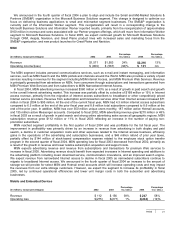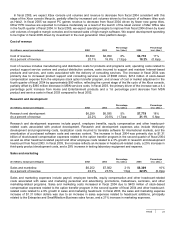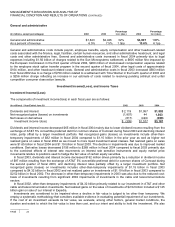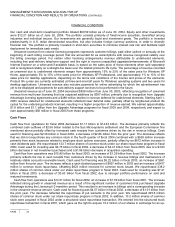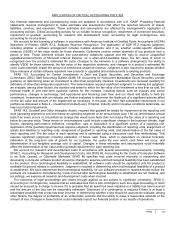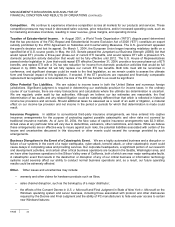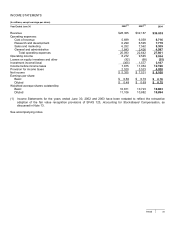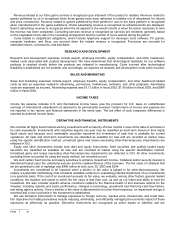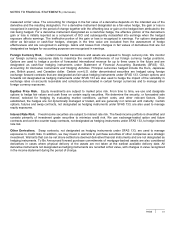Microsoft 2004 Annual Report Download - page 31
Download and view the complete annual report
Please find page 31 of the 2004 Microsoft annual report below. You can navigate through the pages in the report by either clicking on the pages listed below, or by using the keyword search tool below to find specific information within the annual report.
PAGE 31
adversely affect our revenue and operating margins. Unauthorized disclosure of source code could also increase certain
risks described below under “Security”.
New Products and Services. We have made significant investments in research, development and marketing for new
products, services, and technologies, including Longhorn, Microsoft .NET, Xbox, business applications, MSN, and mobile
and wireless technologies. Significant revenue from new product and service investments may not be achieved for a
number of years, if at all. Moreover, these products and services may not be profitable, and even if they are profitable,
operating margins for these businesses may not be as high as the margins we have experienced historically.
Litigation. As discussed in Note 17 – Contingencies of the Notes to Financial Statements, we are subject to a variety of
claims and lawsuits. Adverse outcomes in some or all of the pending cases may result in significant monetary damages or
injunctive relief against us. We are also subject to a variety of other claims and suits that arise from time to time in the
ordinary course of our business. While management currently believes that resolving all of these matters, individually or in
the aggregate, will not have a material adverse impact on our financial position or results of operations, the litigation and
other claims noted above are subject to inherent uncertainties and management’s view of these matters may change in
the future. There exists the possibility of a material adverse impact on our financial position and the results of operations
for the period in which the effect of an unfavorable final outcome becomes probable and reasonably estimable.
Security. Maintaining the security of computers and computer networks is an issue of critical importance for us and our
customers. There are malicious hackers who develop and deploy viruses, worms, and other malicious software programs
that attack our products. While this is an industry-wide phenomenon that affects computers across all platforms, our
customers in particular have been victims of such attacks and will likely continue to be so. We are devoting significant
resources to addressing these critical issues. We are focusing our efforts on engineering more secure products,
optimizing security and reliability options and settings when we deliver products, and providing guidance to help our
customers make the best use of our products and services to protect against computer viruses and other attacks on their
computing environment. In addition, we are working to improve the deployment of software updates to address security
vulnerabilities discovered after our products are released. We are also investing in mitigation technologies that help to
secure customers from attacks even when such software updates are not deployed. We are also advising customers on
how to help protect themselves from security threats through the use of our online automated security tools, our published
security guidance, and the deployment of security software such as firewalls, antivirus, and other security software. These
steps could adversely affect our operating margins. Despite these efforts, actual or perceived security vulnerabilities in our
products could lead some customers to seek to return products, to reduce or delay future purchases, or to purchase
competitive products. Customers may also increase their expenditures on protecting their computer systems from attack,
which could delay adoption of new technologies. Any of these actions by customers could adversely affect our revenue.
Declines in Demand for Software. If overall market demand for PCs, servers, and other computing devices declines
significantly, or consumer or corporate spending for such products declines, our revenue will be adversely affected.
Additionally, our revenue would be unfavorably impacted if customers reduce their purchases of new software products or
upgrades to existing products because new product offerings are not perceived as adding significant new functionality or
other value to prospective purchasers. A significant number of customers purchased license agreements providing
upgrade rights to specific licensed products prior to the transition to Licensing 6.0 in July 2002. These agreements
generally expired throughout fiscal 2004 and will largely be expired by the end of the first fiscal quarter in 2005. The rate
at which such customers renew these contracts could adversely affect future revenue. We are making significant
investments in the next release of the Windows operating system, code-named Longhorn. If this system is not perceived
as offering significant new functionality or value to prospective purchasers, our revenue and operating margins could be
adversely affected.
Product Development Schedule. The development of software products is a complex and time-consuming process.
New products and enhancements to existing products can require long development and testing periods. Significant
delays in new product releases or significant problems in creating new products, particularly any delays in the Longhorn
operating system, could adversely affect our revenue.
General Economic and Geo-Political Risks. Softness in corporate information technology spending or other changes
in general economic conditions that affect demand for computer hardware or software could adversely affect our revenue.
Terrorist activity and armed conflict pose the additional risk of general economic disruption and could require changes in
our operations and security arrangements, thus increasing our operating costs. These conditions lend additional
uncertainty to the timing and budget for technology investment decisions by our customers.


